best platforms for testing chatbot performance and reliability
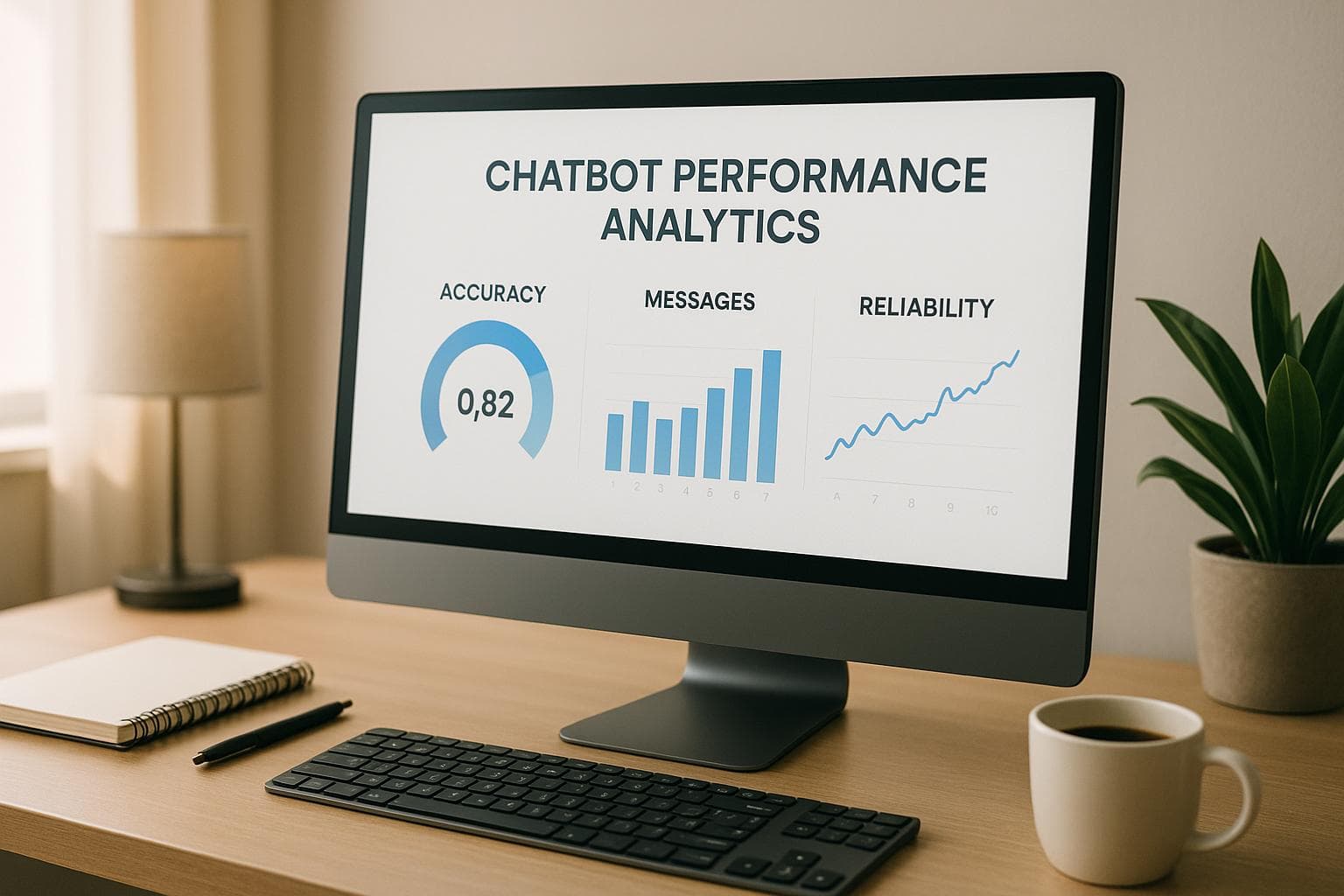
best platforms for testing chatbot performance and reliability
Chatbot testing is a critical step to ensure your bot delivers accurate responses, smooth interactions, and reliability. With over half of consumers preferring AI-powered assistance, businesses can’t afford chatbot failures - 30% of users would switch to competitors after a bad experience. This guide compares top platforms for testing chatbot performance, helping you choose the best fit for your needs.
Key Platforms:
- OpenAssistantGPT: No-code tool with automated testing scenarios, real-time performance checks, and U.S.-specific customization. Plans start at $18/month.
- Cekura: Focuses on multi-turn conversation testing, live monitoring, and compliance-heavy industries. Pricing is custom upon request.
- Botium: Offers functional, performance, and security testing for 55+ chatbot technologies. Free core version; enterprise plans start at ~$463/month.
- TestMyBot: Open-source framework for flexible, multi-channel testing with CI/CD integration. Free to use.
- Minitest for Chatbots: Limited public info; possibly a niche Ruby framework.
Quick Comparison Table:
| Platform | Cost | Testing Focus | CI/CD Integration | Strengths |
|---|---|---|---|---|
| OpenAssistantGPT | $0–$54/month | Basic to intermediate | Basic | No-code, budget-friendly |
| Cekura | Custom pricing | Multi-turn, compliance | Yes | Advanced compliance, live monitoring |
| Botium | $463–$1,079/month | Functional, performance | Yes | Broad compatibility, detailed analytics |
| TestMyBot | Free | Multi-channel, flexible | Yes | Open-source, developer-friendly |
| Minitest for Chatbots | Unknown | Unknown | Unknown | Limited public documentation |
Choosing the right platform depends on your team size, technical needs, and budget. Small businesses might prefer OpenAssistantGPT for affordability, while enterprises with complex needs should consider Botium or Cekura.
Test Your Prompts with Every ChatBot (for Free)
1. OpenAssistantGPT
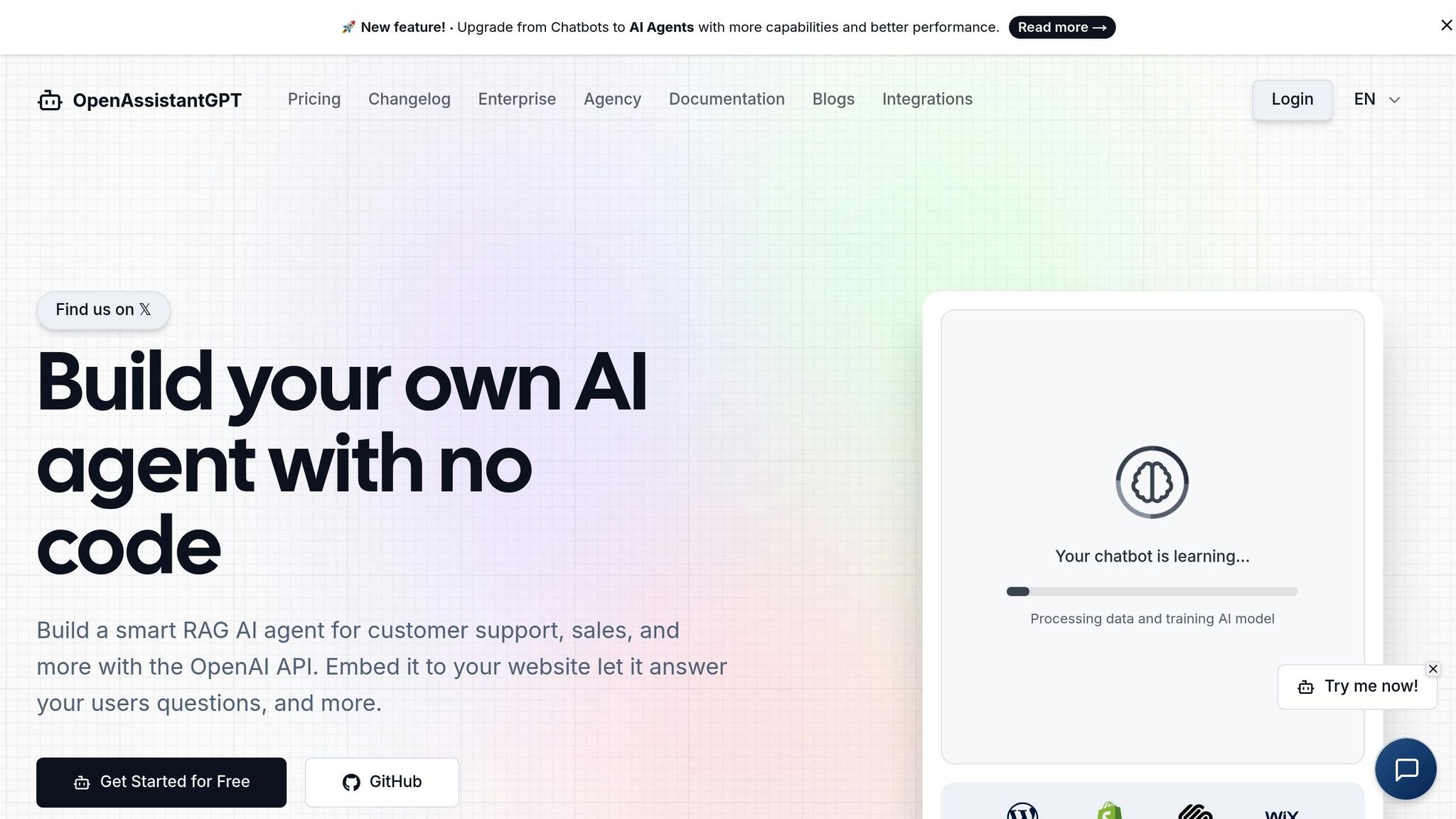
OpenAssistantGPT is a no-code chatbot builder powered by OpenAI's Assistant API, now equipped with tools to test how chatbots perform in real-world scenarios.
Testing Capabilities
The platform automatically creates testing scenarios, including common interactions and less typical edge cases, to ensure conversation flows are working as intended. It supports regression testing, real-time performance checks, and pre- and post-deployment evaluations. For example, a U.S.-based e-commerce company using OpenAssistantGPT saw a 30% reduction in customer-reported errors and a 15% improvement in response times.
Integration Support
OpenAssistantGPT integrates smoothly into existing workflows, making it easy to embed testing into CI/CD pipelines. It supports WebSocket and custom API integrations, enabling automated regression tests whenever updates are made.
Custom Metrics
The platform tracks essential metrics like CSAT (customer satisfaction), latency, and interruption rates. It also allows businesses to define their own metrics, whether through Boolean checks, rating systems, or code-based validations. For instance, a company might measure response accuracy for tech support or analyze conversion rates for sales chatbots.
Additionally, OpenAssistantGPT caters to U.S.-specific needs, such as MM/DD/YYYY date formats, U.S. dollar currency symbols, imperial measurement units, and American English spelling. This flexibility ensures the platform meets diverse business requirements.
Pricing
OpenAssistantGPT offers several pricing options:
- Free Plan: Covers up to 500 messages per month for basic testing.
- Basic Plan: Costs $18/month and supports up to 9 chatbots with unlimited messages.
- Pro Plan: Priced at $54/month, it includes advanced testing, support for up to 27 chatbots, and custom domains.
- Enterprise Plan: Features unlimited testing and custom SLA pricing.
The platform's advanced features, like real-time monitoring and scenario coverage, enhance chatbot quality. For example, it can send Slack alerts when deviations occur, helping businesses maintain high standards for conversational AI performance.
2. Cekura
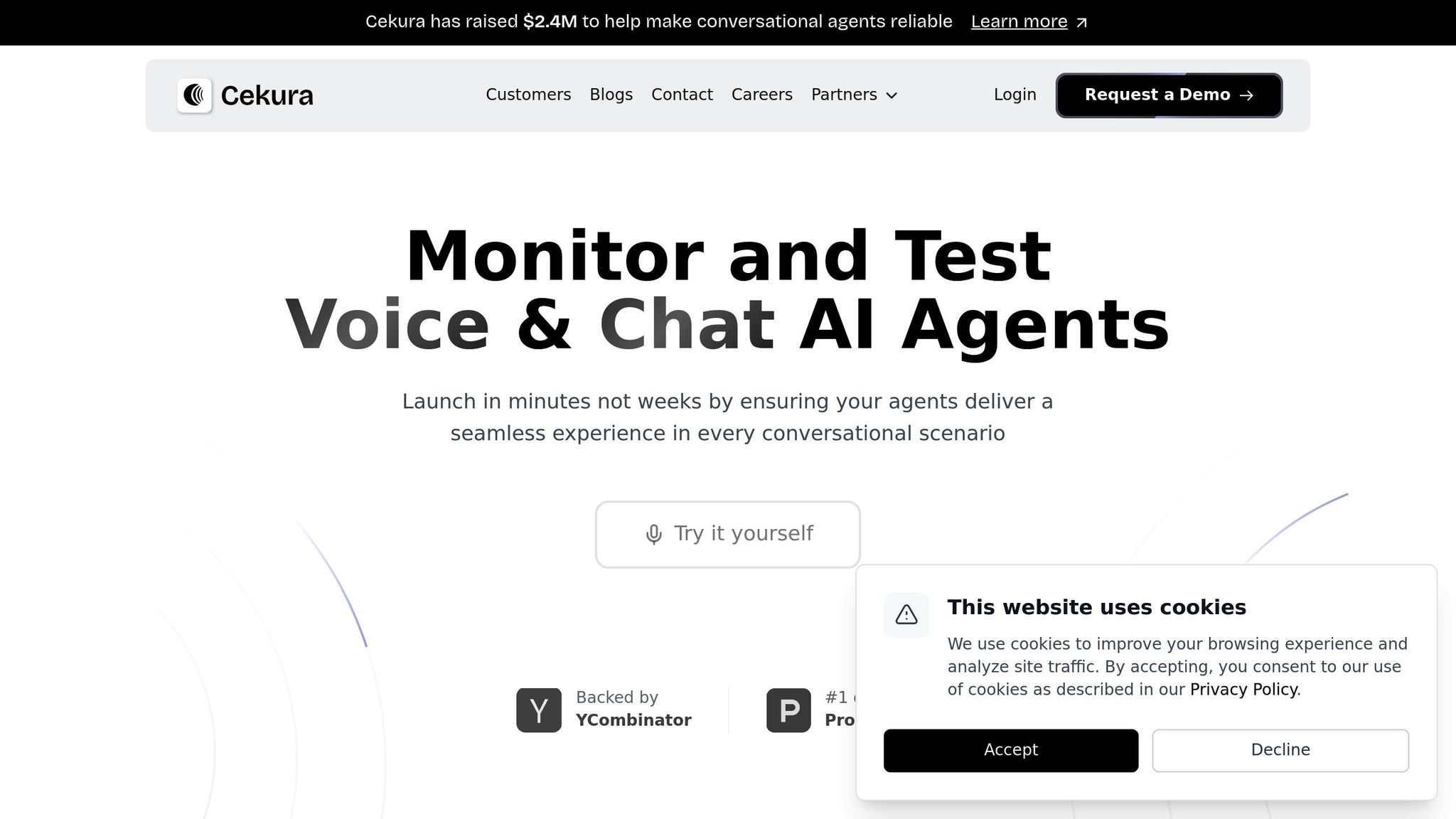
Cekura specializes in testing and monitoring chatbots powered by large language models (LLMs). By automatically generating testing scenarios, the platform helps identify potential failures before they affect customers.
Testing Capabilities
Cekura generates a wide range of scenarios based on chatbot prompts or workflow outlines. These include happy-path, sad-path, edge-case, and adversarial situations. It runs thousands of simulations overnight, covering various user profiles like non-native speakers, impatient users, and those with grammatical errors.
The platform is particularly effective for multi-turn conversation testing, focusing on areas like instruction-following accuracy, hallucination rates, and compliance requirements. This makes it especially valuable for industries with strict regulations, such as healthcare and finance.
"Building agents took only a few hours anyway. It was testing that took us days because you cannot send anything half-baked in production in a compliance heavy industry like ours. Cekura tests all that and more efficiently."
– Sameer Fulzele, Co-founder, Rifa
Cekura also offers a conversation replay feature, enabling teams to revisit and resolve known trouble spots from real-world interactions. This ensures fixes are effective and prevents recurring issues. Additionally, it monitors live customer conversations in real time, sending instant alerts for any deviations. These capabilities extend seamlessly into the integration phase.
Integration Support
Cekura integrates easily with chatbots through WebSocket and custom APIs, making it compatible with most systems. Its integration with CI/CD pipelines allows for automatic regression testing whenever prompts or models are updated.
"Cekura has become a critical part of our development pipeline, now we don't ship any agents to production without first aggressively testing them out on Cekura."
– Rishi Chowdhary, CEO, Kastle
For enterprise clients, the platform supports custom workflows through features like SSO and tailored API connections.
Custom Metrics
Cekura’s flexibility extends to performance tracking, offering both predefined and custom metrics. Standard metrics include CSAT, latency, interruption handling, instruction following, and hallucination rates. Businesses can also define custom metrics using Boolean checks, rating systems, or custom code.
"They tailor metrics to specific requirements and offer clear performance guidance."
– Danial Afzal, CEO, Decoda Health
The platform also evaluates advanced conversational metrics like conversation flow, memory retention, user interruptions, adherence, empathy, and repetition - key factors for assessing multi-turn interactions.
Pricing
Cekura is a paid service, but specific pricing details aren’t publicly listed. For tailored pricing options, reach out to Cekura at sidhant@cekura.ai. The company has raised $2.4 million, reflecting strong investor confidence in its approach to chatbot testing and monitoring.
3. Botium
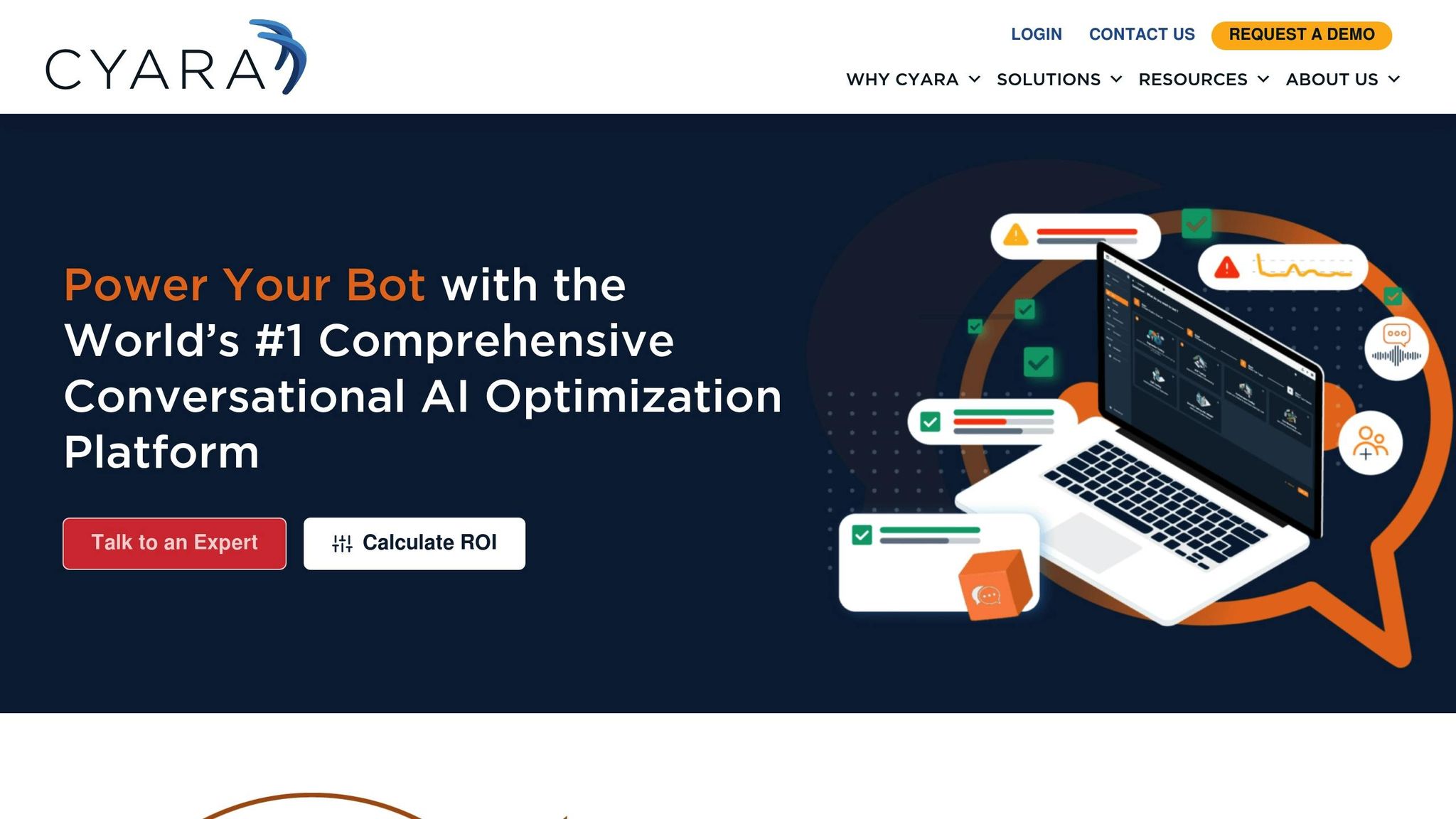
Botium stands out as a trusted platform for testing conversational AI. It offers a full suite of tools designed to fine-tune chatbot performance at every stage, from initial development and training to ongoing monitoring and refinement. This makes it a comprehensive solution for chatbot testing needs.
Testing Capabilities
Botium provides a wide range of testing options, including functional, performance, load, and security testing. It ensures compliance with standards like OWASP and GDPR for both text and voice interfaces. The platform leverages AI-driven data generation powered by GPT-4 to create diverse test scenarios automatically.
A standout feature is its ability to simulate user behavior. Botium replicates real-world interactions by incorporating typos, shorthand, slang, and variations in voice conditions, such as background noise, pitch, accents, and tone. This realistic approach helps uncover potential issues before they affect actual users.
For conversational flow testing, Botium uses BotiumScript, allowing teams to define test cases as conversational flows. These test cases can be created in widely used formats and paired with utterance files for dynamic input and response validation.
The platform also offers advanced assertion mechanisms to verify chatbot behavior. Teams can validate UI elements like buttons and media, use regular expressions, check tone, confirm hyperlink functionality, and test custom message payloads with JSONPath queries. The CHECKLINK function, for instance, ensures URLs provided by chatbots return proper HTTP response codes.
To address concerns about the reliability of AI-generated responses, Botium includes a FactCheck module. This feature verifies the accuracy of chatbot replies, a critical tool as businesses increasingly rely on AI for customer interactions.
For voice testing, Botium supports major text-to-speech and speech-to-text engines, ensuring robust voice interface evaluations.
Integration Support
Botium is designed to integrate smoothly into various development workflows. It supports over 55 chatbot technologies and all major NLU/NLP engines, enabling direct connectivity for automated testing. It also connects with popular platforms like Google Dialogflow, Amazon Lex, IBM Watson Assistant, Rasa, Microsoft Bot Framework, and Facebook Messenger.
"One of the key principles of Botium is to prevent vendor-lock-in - we strive to be open to the highest degree for integration into any chatbot vendors and custom pipelines out there."
– Florian Treml, Senior Director of Engineering at Botium
The platform works seamlessly with modern development practices, supporting CI/CD pipelines, popular test runners, and end-to-end UI testing tools.
Custom Metrics
Botium provides deep analytics tools to help teams continuously improve their chatbots. While it doesn’t offer traditional custom metric creation, it allows for highly customizable evaluations. Teams can assert custom message payloads using JSONPath queries and access detailed analytics through customizable dashboards and reports. This enables in-depth root-cause analysis and ongoing optimization.
The platform collects technical performance metrics such as response accuracy, hallucination rate, response time, and intent recognition accuracy. These insights are crucial for assessing chatbot performance and ensuring a smooth user experience.
Pricing
Botium follows a freemium model, with its core platform being free and open-source, available on GitHub. The free version supports up to 50 tests per day, making it an excellent option for smaller teams or projects.
"Botium is free and Open Source, and available on Github."
– Botium documentation
For organizations needing additional features or support, an Enterprise Support option is available, though pricing details are not publicly disclosed.
sbb-itb-7a6b5a0
4. TestMyBot
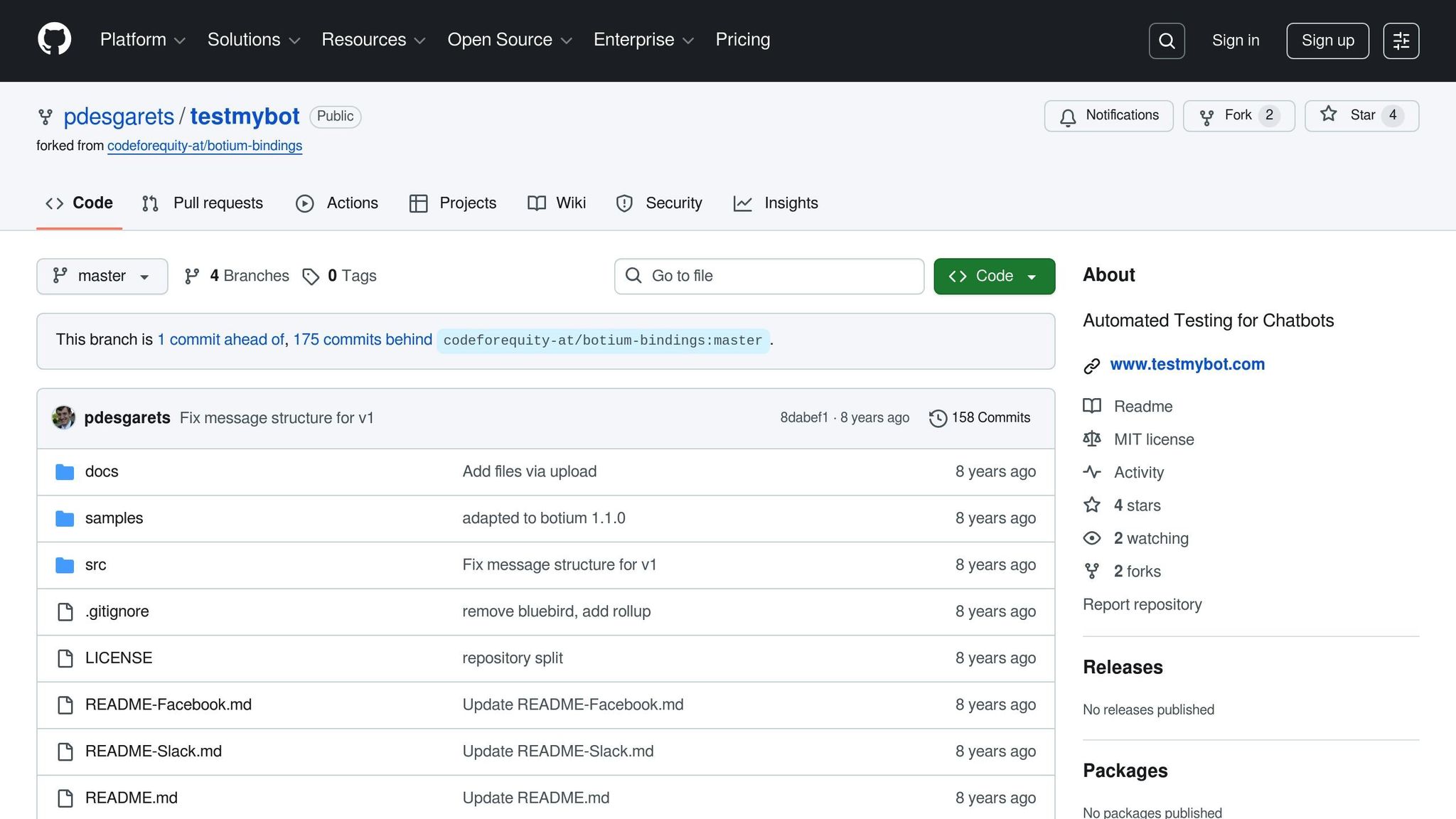
TestMyBot takes a unique approach to chatbot testing, focusing on flexibility and giving developers full control. This test automation framework is designed to work seamlessly with CI/CD pipelines and popular test runners, making it a great fit for teams that already have established testing workflows.
"TestMyBot is a test automation framework for your chatbot project. It is unopinionated and completely agnostic about any involved development tools." – Florian Treml
Testing Capabilities
One of TestMyBot's standout features is its sandbox environment, which captures live chat interactions and automatically generates compact test cases and reports. This setup simplifies development by automating repetitive tasks and speeding up the testing process.
Developers have multiple ways to create test cases. They can use an interactive browser-based tool for quick, intuitive test creation or opt for manual methods, writing transcripts in a text editor for more precise control. This flexibility makes it easier to tailor the testing process to specific project needs.
Integration Support
TestMyBot's Docker-based architecture and adaptable configuration files make it compatible with a wide range of messaging platforms and test runners. By running chatbots in local containers, developers can handle API mocking and DNS manipulation during testing.
It supports platforms like Facebook Messenger and Microsoft Bot Framework through configurable setups. Additionally, built-in helpers for Jasmine and Mocha streamline the testing process, while its agnostic design ensures compatibility with other test runners and assertion libraries. Developers can even load chatbot code directly from Git repositories by specifying Git URLs and running preparation commands like npm install.
Custom Metrics
TestMyBot also stands out for its custom performance evaluation features. Developers can define their own performance criteria instead of relying on preconfigured metrics. By using callback functions within test specifications, teams can establish custom success benchmarks - such as regular expression matching or "contains" checks - to compare bot responses against expected outcomes.
Pricing
TestMyBot is completely free and open source. This makes it an affordable option for teams of all sizes, while also giving developers the freedom to modify and extend the platform to meet their specific needs.
5. Minitest for Chatbots
There's not much public information available about Minitest for Chatbots, which makes understanding its role in chatbot performance testing a bit tricky. The name hints at a possible adaptation of the Ruby Minitest framework tailored for chatbot scenarios, but without clear documentation or evidence of widespread use, it's hard to pin down its exact capabilities or how it integrates with other tools.
When evaluating testing platforms, having access to reliable documentation and evidence of adoption is essential. In comparison to other platforms that provide detailed resources and active communities, the lack of information about Minitest makes it challenging for development teams to assess its value. For teams working on production chatbot systems, tools with transparent features, strong community support, and a proven track record should take priority. This ensures confidence in the tool's ability to meet performance and testing needs effectively.
Platform Advantages and Disadvantages
When choosing a platform, it’s essential to weigh their strengths and weaknesses to align with your testing goals and budget.
OpenAssistantGPT is popular for its no-code interface and versatile chatbot-building tools. Starting at $18/month for unlimited messages, it’s budget-friendly and even includes lead collection features. However, its focus is more on chatbot creation than advanced testing, which may require you to use additional tools for thorough performance evaluations. The free plan, capped at 500 messages, may also feel restrictive for larger-scale testing.
Botium shines with its automated testing capabilities, supporting over 55 chatbot technologies. It integrates seamlessly with CI/CD pipelines and offers detailed NLP analytics dashboards. On the downside, its pricing - around $463.32/month for the Professional plan and $1,078.92/month for the Enterprise plan - can be a barrier for smaller teams. Additionally, the absence of a free trial makes it difficult to assess its value before committing.
TestMyBot is designed for multi-channel testing and integrates well with CI/CD workflows, making it a strong choice for continuous testing needs. While it supports cross-platform testing, the lack of disclosed pricing information can complicate decision-making.
Rasa offers a highly flexible, open-source foundation with extensive Python customization options. Its free Developer Edition supports up to 1,000 external conversations monthly, while the Growth plan starts at $35,000 per year. Built-in testing tools and advanced NLP capabilities are a plus, but the platform’s steep learning curve and developer-centric design can pose challenges for non-technical teams.
| Platform | Monthly Cost (USD) | End-to-End Testing | CI/CD Integration | Key Strengths | Main Limitations |
|---|---|---|---|---|---|
| OpenAssistantGPT | $0–$54 | Limited | Basic | No-code, budget-friendly | Focused on chatbot building |
| Botium | ~$463–$1,079 | ✓ | ✓ | 55+ bot technologies | High cost, no free trial |
| TestMyBot | Not disclosed | ✓ | ✓ | Multi-channel testing | Pricing not disclosed |
| Rasa | Free–$35,000/year | ✓ | ✓ | Open-source, customizable | Steep learning curve |
These comparisons provide a foundation for analyzing cost, performance, integration, and scalability.
Cost considerations vary widely. Open-source options like Rasa can be appealing for tech-savvy teams, while enterprise solutions like Botium come with higher price tags. As chatbot expert David Keszeg points out:
"Your bot will be just as good as you train it 🙂 hence why you need to ensure the underlying NLP training data is top-notch!"
- David Keszeg
Beyond costs, platforms differ in their performance testing capabilities. Botium excels in stress testing and performance validation, while TestMyBot focuses on functional testing across various channels. For organizations needing extensive load testing, additional tools like JMeter might be required.
Integration complexity is another key factor. Platforms like Botium and Rasa, with strong CI/CD integration, fit naturally into existing development workflows. Simpler solutions, however, may require more manual testing processes, depending on your team’s technical proficiency.
Finally, scalability becomes critical as testing demands grow. While enterprise platforms offer robust capabilities at a premium, smaller organizations might prefer platforms with flexible pricing that supports scaling without significant upfront costs.
Final Recommendations
Choosing the right chatbot testing platform hinges on factors like your business size, technical capabilities, and compliance needs. With the global chatbot market expected to surpass $27 billion by 2030, growing at an annual rate of 23.3%, it's clear that finding a platform tailored to your business stage is more important than ever.
For small businesses and startups, OpenAssistantGPT is a solid starting point. At just $18/month, it offers unlimited messaging, an easy-to-use no-code interface, and extra features like lead collection - perfect for teams in growth mode.
Mid-sized companies might benefit from TestMyBot. This platform stands out with its strong CI/CD integration and multi-channel testing capabilities. As an open-source option, it provides the adaptability needed for continuous testing while keeping expenses reasonable.
For large enterprises, Botium is a top contender. It excels in performance benchmarking and integrates seamlessly with CI/CD pipelines, making it well-suited for handling complex, high-volume chatbot operations.
If your business operates in a regulated industry within the U.S., compliance should be a top priority. Look for platforms that explicitly support certifications like HIPAA, SOC 2, GDPR, and CCPA. With new regulations emerging, such as state-level AI transparency requirements and bias prevention laws, rigorous compliance testing is becoming increasingly essential.
FAQs
What should businesses look for in a platform to test chatbot performance and reliability?
When choosing a platform to evaluate chatbot performance and reliability, businesses should prioritize factors like accuracy, response speed, and the platform’s ability to handle heavy user traffic without interruptions. It's crucial to confirm that the platform can test the chatbot’s consistency and reliability across various scenarios.
Other key factors to consider include how easily the platform integrates with existing systems, its automation features for simplifying testing processes, scalability to accommodate future growth, and security measures to safeguard sensitive data. Cost is another important aspect - businesses should ensure the platform’s features justify its price and align with their budget and long-term objectives.
Focusing on these aspects helps businesses select a testing platform that not only boosts chatbot performance but also improves user satisfaction and streamlines operations.
How does integrating with CI/CD pipelines improve chatbot testing?
Integrating chatbot testing into CI/CD pipelines simplifies the development process by allowing automated and continuous testing. This method catches bugs early, maintains consistent quality, and minimizes the chances of errors during deployment.
With automated tests at every stage, teams gain real-time feedback, conduct thorough performance evaluations, and speed up release cycles. This approach not only boosts the chatbot's reliability but also improves its functionality and the experience it delivers to users.
Why do chatbot testing platforms need to comply with industry regulations?
Ensuring that chatbot testing platforms comply with industry regulations is crucial for several reasons. First and foremost, it protects sensitive user data, ensuring privacy and security. This is especially critical in tightly regulated fields like finance and healthcare, where privacy and ethical AI practices are non-negotiable.
Beyond safeguarding data, compliance fosters trust among users and regulators. It helps prevent biases, secures personal information, and encourages responsible AI practices. By following these regulations, businesses not only avoid legal troubles but also uphold their reputation and ensure their chatbots meet professional and ethical standards.